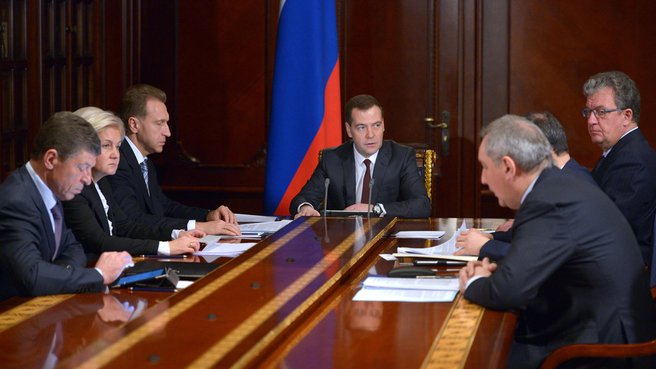Agenda: Pension indexing; law and order in public places; universal communication services; increasing the number of state officials on the boards of directors of companies with state capital.
Transcript:
Dmitry Medvedev:
<…> Regarding law and order in public places, we have a concept, which is defined as a technical programme, called Safe City that is being used in a number of areas, although with varying degrees of focus.
In view of this, we’ve agreed to establish an interdepartmental commission to oversee the related issues.
Mr Rogozin (Dmitry Rogozin), please.
Dmitry Rogozin: We launched the project to create a package of technologies to ensure public safety in Russian cities in 2007, but we mostly worked on it separately at the municipal level. We didn’t have a comprehensive approach to this goal. We’ll now establish a commission which will have the following tasks. We need unified software to ensure public safety at every level of the Safe City Programme. We should not provide relief but take proactive measures. In addition to monitoring busy public spaces, we also need to monitor critically important facilities, specifically the infrastructure. Of course, the important elements are not only the technology but also the equipment, which should use smart methods to focus on the actions that stand out from the general picture and so should attract the attention of law-enforcement agencies.
Dmitry Rogozin: "We’ll now establish a commission which will have the following tasks. We need unified software to ensure public safety at every level of the Safe City Programme. We should not provide relief but take proactive measures. In addition to monitoring busy public spaces, we also need to monitor critically important facilities, specifically the infrastructure."
We are cooperating with Russian defence enterprises on this project. The first meeting of the new commission will be held in the next few days jointly with the commission on the introduction of the ERA-GLONASS accident emergency response system, because it is crucial to use these satellite services. ERA-GLONASS has become operational this year and will also be used within the framework of the Safe City Programme. I hope that it will prove its efficiency.
Dmitry Medvedev: We’ll see, and you’ll report back what happens.
<…> Mr Shuvalov (Igor Shuvalov), you are completing the nomination of candidates for the boards of directors in accordance with the law on joint-stock companies. People worry that the boards will include many state officials. Report please.
Igor Shuvalov: In accordance with corporate procedures, the Government of the Russian Federation as a stakeholder should submit a list of its candidates to these companies’ boards of directors by 30 January.
The procedure was radically changed this year. We have established a special commission at the Ministry of Economic Development to consider candidates whose names have been posted on the ministry’s website. Candidates can also nominate themselves. The commission has discussed the candidates that were nominated by the ministries and agencies and also the self-nominated candidates.
Igor Shuvalov: "We have established a special commission at the Ministry of Economic Development to consider candidates whose names have been posted on the ministry’s website. Candidates can also nominate themselves. The commission has discussed the candidates that were nominated by the ministries and agencies and also the self-nominated candidates."
We have also established a conflict of interests commission at the Federal Agency for State Property Management, following complaints that some independent directors were not quite or not at all independent. It has been recommended that the Government not nominate some independent directors.
How will the figures change compared with 2013?
There were 102 independent directors in 2013, but this year we plan to nominate 106, and the number of state officials nominated for these positions will increase from 122 to 136. In short, we’ll nominate more independent directors and also 14 more state officials. The reason behind this is that some directors have no access to confidential information and information that constitutes state secrets in the companies that deal with these issues. This is why people wonder if more representatives from ministries and agencies will be included on the boards this year. The answer is yes, but only by 14 people, and then there will also be more independent directors.
Dmitry Medvedev: Please monitor this proportion. There are no universal formulas in this area, but at least it’s clear that we took the right decision several years ago to prevent ministers and other Government members, as well as members of the Presidential Executive Office, from chairing or holding seats on the boards of directors. There should be state officials on the boards, but only in a reasonable proportion and only in the positions that allow them to take part in making these companies’ decisions.
<…>











